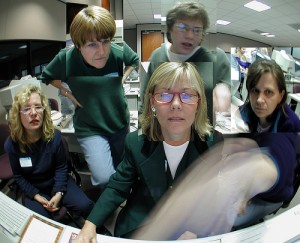
If you're a new teacher in your first classroom, a little advice from a veteran educator goes a long way.
For those who can't get face-to-face mentoring time, online mentoring can be a big help, says Alyson Mike, director of online professional development at the New Teacher Center, a nonprofit based in Santa Cruz, CA.
The New Teacher Center's largest endeavor is called e-Mentoring for Student Success (eMSS), a year-long, nationwide mentoring program that pairs novice science, math, and special education teachers with those with experience. Begun in 2002 through a grant from the National Science Foundation, the program offers new teachers constant interactivity with a content-specific mentor as well as research-based curricula. Often, eMSS clients are school districts or departments of education who want to offer more professional development opportunities to their beginning teachers in an effort to bolster AYP scores or new-teacher retention rates.
For educators looking for online mentoring programs, take a look at these:
- Illinois New Teacher Collaborative-Online: A statewide support program for new teachers in Illinois that offers real-time chat using Moodle, content-specific online resources, videoconferencing, and group discussion forums.
- WINGS (Welcoming Interns and Novices with Guidance and Support): Offered through UTeach, a science and math teacher preparation program at the University of Texas at Austin, WINGS provides private online discussions between mentors and mentees and pedagogical resources for new teachers during their first few years.
- ENDAPT (Electronic Networking to Develop Accomplished Professional Teachers): A collaboration between the school of Education at Virginia's College of William & Mary and the Center for Teaching Quality's Teacher Leader Network includes large online group discussions, private chat between mentors and mentees, and an online community of practice using a platform called Tapped In.
- PACT (Performance-based Academic Coaching Team): A Texas-based program that provides an e-mentor, online forums, chat rooms, teaching tools, and other resources for new teachers.
- UWeb Teacher Support Network : Based out of the University of Washington College of Education, UWeb also uses Tapped In to support both pre-service and in-service teachers by offering curriculum and instruction resources, group discussions, and a helpline.
So, why online mentoring as opposed to face-to-face? Wouldn't it be better if all beginning teachers could have in-person mentor relationships?

